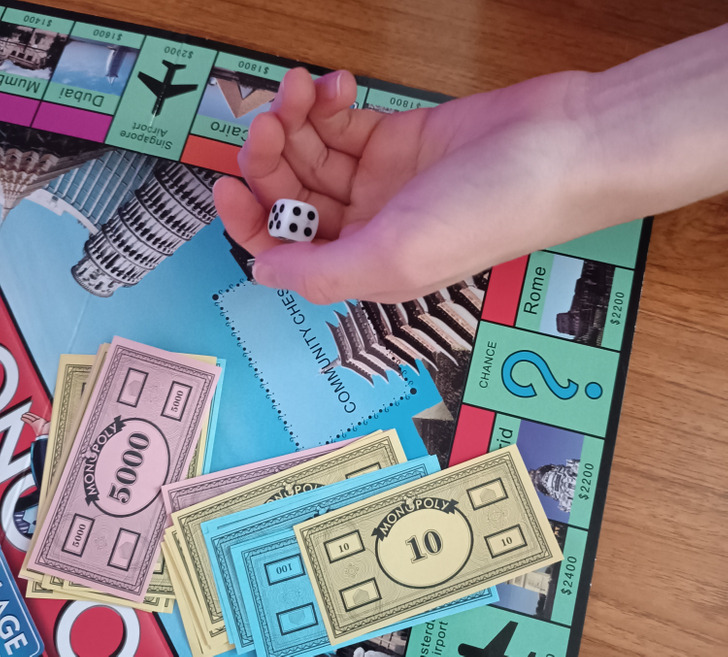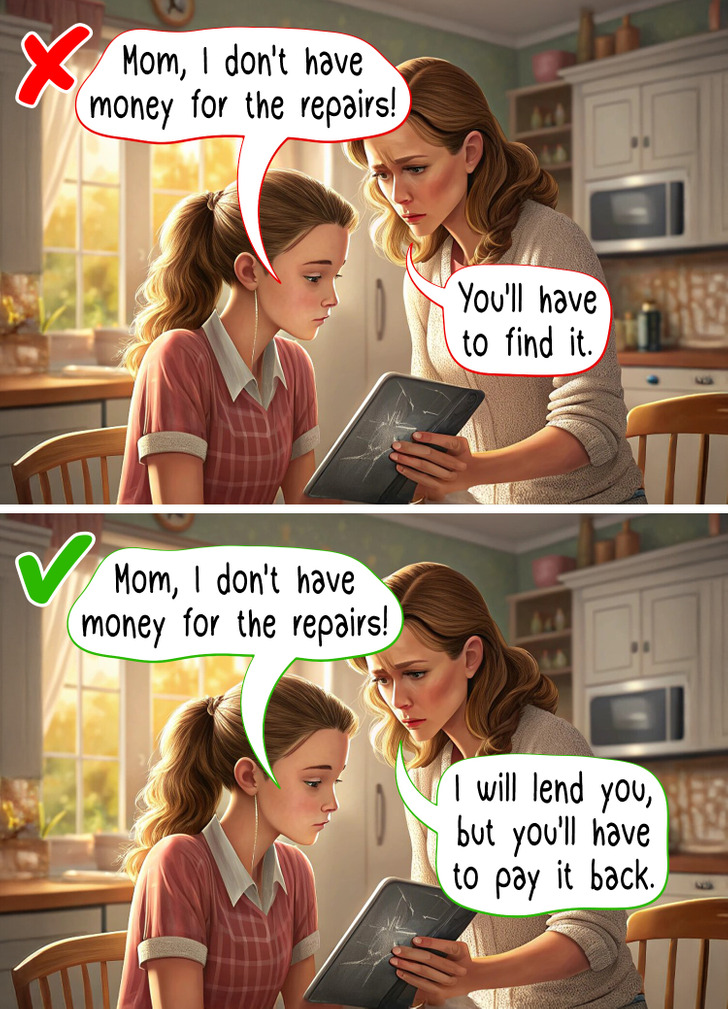16 Stereotypes That Modern Parents Should Leave in the Past


Money is often the cause of heated arguments between parents and their teenage children. Teenagers usually want to decide for themselves what to spend it on, but they don’t know how to handle money very well yet. We’ve put together some tips to help parents teach their children how to deal with their money wisely.
Images created with artificial intelligence are used.
Most teenagers have a complicated relationship with money. On the one hand, teenagers are surrounded by many temptations: they want to wear fashionable clothes, show off the same expensive gadgets as their classmates, spoil themselves with all sorts of goodies, and go to music concerts. On the other hand, there are still not many opportunities for earning money, and children often don’t know how to spend money wisely.
In addition, teenagers have a lot of contradictory desires, and parental authority becomes less important to them. At the same time, any parent wants their child to learn to allocate funds wisely, because in a couple of years they will have to do it themselves.
Some parents advise giving their child a certain amount of money for weekly expenses, for example, by paying for household chores. Others are against this practice, because housework is a shared activity and no one pays adults for it.
Another option is to agree with your child on a certain amount for pocket money. But the child should spend it not on games and food, but on clothes. Buying the right clothes is an eternal stumbling block between parents and teenagers. Teenagers often have completely different views on fashion than adults. And if the child will buy their own things, they will, firstly, be able to choose something to their taste, and secondly, quickly learn to spend money wisely.
Start with something simple: T-shirts, shorts, underwear, and then move on to more complex items. Not all children will be able to calculate the budget at the first attempt, and there is nothing wrong about that. Don’t scold the child for mistakes made — it is better to sit down with a piece of paper and a pen and calculate at what point things went wrong.

As soon as the child has their own money, you can teach them to plan a budget. For example, ask your teenager to divide the money into 3 parts.
50% of the money goes for compulsory needs — things that need to be paid in any case, such as transport fares and groceries. 30% goes to satisfy small weaknesses: computer games, cafés, trips to the movies, and so on. And 20% is put aside in a piggy bank to cover unforeseen expenses or to make a major purchase if necessary.
First of all, you should discuss with your child what they consider to be obligatory expenses, and what refers to the second category. It may seem like a good idea to buy an expensive T-shirt, especially as shopping makes you feel good, but it’s unlikely that you can’t live without it. To make it easier for your teenager to understand this, it’s worth taking them to the supermarket at the weekend to see exactly what the essentials are. You can also plan a monthly family budget together.

You can, of course, save money just for the sake of the process, but your child will probably get bored of it quickly. So, it’s better to set some attractive but achievable goal, such as new fashionable sneakers, a phone, or a computer game. Suggesting that your child save money for a car or education is not worth it. Firstly, this process will take too long, and secondly, it’s unlikely that all these things seem relevant to them.
At first, it’s worthwhile to write down together how long the child will have to save and how much money they should save each month. If your teenager has a bank card, you can make a special account and set limits on cash withdrawals and transactions. This will make it easier to control their impulses and prevent them from spending the money they have saved on unnecessary things.

One of the most difficult lessons not only for children but also for adults is to learn to wait before buying something you like. All of us, regardless of our age, find it hard to suppress our natural impulse to pay a decent amount of money on a gadget or clothes we like. Therefore, don’t buy anything at the first request of the child, even if they claim that all their classmates have this thing.
It’s better to ask the child to wait a couple of weeks or even months. Ideally, you should ask them to invest their own money in the purchase — this can immediately cool interest. But if your child decided to spend on the right thing, don’t pay for it yourself at the last minute. Otherwise, the effect of expectation will disappear, and parental authority will be in doubt. Teenagers tend to care more about things that they paid for with their own money.
The easiest way to learn how to spend money wisely and responsibly is through practice. The theory, of course, can be explained, but if the child doesn’t handle the money themselves, they will unlikely remember it. For example, you can allocate a certain budget for the teenager’s birthday and let them decide where the party will be held, what needs to be bought and who to invite.
In addition, it’s worth showing the child utility bills and after some time to offer to track the dynamics of rising and falling prices. And if the child starts to spend water and electricity more economically, they will be able to understand the difference. Another interesting experiment is to offer your child to look for cheaper products and things that you buy weekly. If they can save some money this way, they can take the difference.

The basics of financial literacy can be learnt through playing games. Good old Monopoly helps you learn how to plan your spending, balance your income and expenses, and save money on unexpected expenses. In addition to it, there are many board and computer games. It may not be as effective as real budgeting, but many children are willing to spend much more time on it.

According to experts, children are much better at calculating their budget if they have to pay for unexpected expenses on their own, rather than asking their parents for money every time. That’s why it’s worth warning your teenager that repairs to their gadgets and urgent purchases are their area of responsibility.
It’s better to let the child learn a difficult lesson at a stage when the costs are not too high and parents can help them. After all, adults can always lend a certain amount of money, and make a payment plan together with the child. At the same time, you can discuss with your child whether it’s worth lending money to friends or, on the contrary, whether it’s worth borrowing money from them. A lot depends on the family’s attitude to this issue.
Some parents complain that when their children become teenagers, they prefer to spend all their free time on the sofa. And although most teenagers need money, not all of them are in a hurry to find their first job.
It’s pointless to nag your child and insist that they urgently need to start looking for sources of income. This will only provoke a conflict.
It’s easier to cheat a bit and secretly ask for help from relatives or friends. You can even offer them to compensate for the cost of the teenager’s salary. After the child gets used to the process, it will be easier for them to find the next job.
And here are necessary skills that are worth teaching your child before they turn 13.











